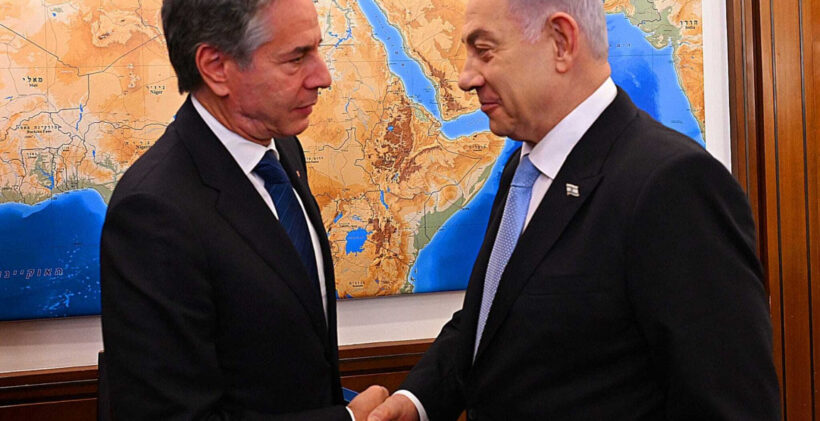There is a growing sense that Washington’s public expressions of optimism over a Gaza ceasefire deal are far from Netanyahu’s war-driven aims.

Gaza ceasefire talks are near to collapse, again, following reports in Israeli media that Prime Minister Benjamin Netanyahu does not believe a truce deal will take place despite a top US diplomat voicing optimism.
US Secretary of State Antony Blinken returned to Washington empty-handed on Tuesday ending his ninth visit to the region since October without a deal after meetings with officials in Egypt, Qatar and Israel.
Speaking to reporters before flying out of Doha on Tuesday, Blinken said the deal must be done and “we will do everything possible to get it across the finish line”.
A day earlier, Blinken said the deal on offer was “probably the best, maybe last, opportunity”.
Despite the pressing need to end the bloodshed, hopes are waning amid reports that Netanyahu had admitted he does not believe a deal will be reached and was reluctant to end the war.
‘Bridging proposal’
Talks this time round hoped to close gaps between Israel and Hamas’ demands, described as a “bridging proposal” by the US.
Following a meeting with Netanyahu on Monday, Blinken alleged that Israel had accepted this and it was now for Hamas to also agree.
But remarks shared in the Israeli media later on Tuesday indicated the Israeli prime minister was not on board with a deal despite Blinken’s assertion.
The premier reportedly told a meeting of the families of the hostages that he was “not sure” there would be a deal and said he would not abandon his desire to maintain an Israeli troop presence in Gaza.
The comments prompted an unusual public rebuke from a senior US administration official who told AFP that such “maximalist statements” by Netanyahu were “not constructive”.
US ‘misleadingly’ blames Hamas
The official US government line, then shared by Western media, has repeatedly blamed Palestinians for “obstructing” a deal, despite Hamas publicly agreeing to President Biden’s 31 May proposal which was based on a UN Security Council motion.
Since then, Israel has added changes to Biden’s deal which have caused frustrations from the Palestinian side.
On Tuesday, Hamas said the latest plan “constitutes a reversal against what the parties reached on July 2, based on Biden’s declaration on May 31, and Security Council Resolution 2735 in June”.
Hamas also rejected Biden’s remarks that it was “backing away” from a deal, describing it as “misleading” and demonstrating the “American bias” towards Israel.
In a statement, Hamas said that Netanyahu has always been “obstructing” an agreement by setting new conditions and demands.
Israeli commentators also noted that Netanyahu’s apparent affirmation of a deal had not prompted a response from his right-wing cabinet members, suggesting that the premier and government insiders, know a deal will not go ahead.
Among observers, there is a growing feeling that the mediators’ public expressions of optimism are far from reality.
Former Israeli government negotiator and political analyst Daniel Levy told the BBC that the US is projecting an idea of progress in order to buy time and “place further military assets in the region”.
Speaking to the broadcaster on Monday, Levy said that Israeli security officials were “still not giving the kind of mandate to negotiators to bring a deal” despite Washington’s assertions.
Israeli officials also told Axios that Blinken’s announcement that Netanyahu supports the US position was baffling, saying his recent actions regarding the Gaza truce talks were causing difficulties.
Rather than agreeing to a US proposal, the sources said that Washington had incorporated some of Netanyahu’s positions while the Israeli leader’s public statements about optimism on the deal were merely political posturing.
Sticking points
One of Israel’s key proposals to leave troops on the Gaza-Egypt border, known by Israel as the ‘Philadelphi Corridor‘, is at odds with both Egyptian officials and Hamas.
Israel wants to man the border zone which it claims is a “weapons smuggling route” for Hamas.
But for Egypt, a military presence there would trigger troubling memories of Israel’s occupation of the Sinai.
The issue has also threatened to cause a major rift between Egypt and Israel and would contravene the landmark Camp David treaty of 1978.
Netanyahu also will not drop demands of an Israeli military presence along the “Netzarim Corridor” which runs across Wadi Gaza and has currently split the enclave in half.
Israel had called for a deal to stipulate that all Palestinians are vetted by Israel before returning to the north – something that was reportedly thrown out by the mediators.
The US previously said it would not support the remainder of troops or “any long-term occupation of Gaza by Israel”.
Washington has implemented a renewed urgency to get a ceasefire deal across the line ahead of the November presidential elections and in a bid to defuse a region on the brink of war amid Iran and Lebanon tensions.
Netanyahu’s apparent unwillingness to budge has put him at odds with most of the Israeli public, who are now calling for a ceasefire to release the remaining 105 hostages, 34 of whom have been confirmed dead by the Israeli military.
Mediators – Qatar, Egypt and the US – are due to meet on Thursday and Friday to resume ceasefire talks.
